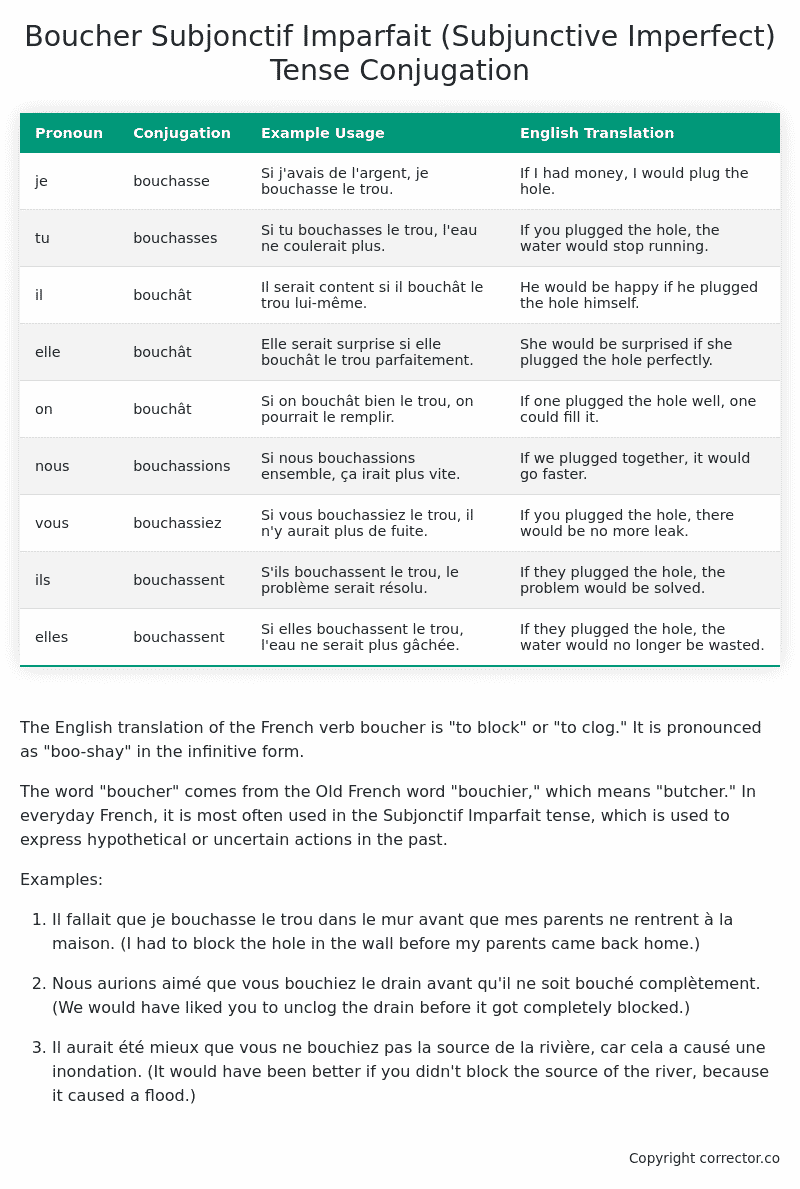Subjonctif Imparfait (Subjunctive Imperfect) Tense Conjugation of the French Verb boucher
Introduction to the verb boucher
The English translation of the French verb boucher is “to block” or “to clog.” It is pronounced as “boo-shay” in the infinitive form.
The word “boucher” comes from the Old French word “bouchier,” which means “butcher.” In everyday French, it is most often used in the Subjonctif Imparfait tense, which is used to express hypothetical or uncertain actions in the past.
Examples:
-
Il fallait que je bouchasse le trou dans le mur avant que mes parents ne rentrent à la maison. (I had to block the hole in the wall before my parents came back home.)
-
Nous aurions aimé que vous bouchiez le drain avant qu’il ne soit bouché complètement. (We would have liked you to unclog the drain before it got completely blocked.)
-
Il aurait été mieux que vous ne bouchiez pas la source de la rivière, car cela a causé une inondation. (It would have been better if you didn’t block the source of the river, because it caused a flood.)
Table of the Subjonctif Imparfait (Subjunctive Imperfect) Tense Conjugation of boucher
| Pronoun | Conjugation | Example Usage | English Translation |
|---|---|---|---|
| je | bouchasse | Si j’avais de l’argent, je bouchasse le trou. | If I had money, I would plug the hole. |
| tu | bouchasses | Si tu bouchasses le trou, l’eau ne coulerait plus. | If you plugged the hole, the water would stop running. |
| il | bouchât | Il serait content si il bouchât le trou lui-même. | He would be happy if he plugged the hole himself. |
| elle | bouchât | Elle serait surprise si elle bouchât le trou parfaitement. | She would be surprised if she plugged the hole perfectly. |
| on | bouchât | Si on bouchât bien le trou, on pourrait le remplir. | If one plugged the hole well, one could fill it. |
| nous | bouchassions | Si nous bouchassions ensemble, ça irait plus vite. | If we plugged together, it would go faster. |
| vous | bouchassiez | Si vous bouchassiez le trou, il n’y aurait plus de fuite. | If you plugged the hole, there would be no more leak. |
| ils | bouchassent | S’ils bouchassent le trou, le problème serait résolu. | If they plugged the hole, the problem would be solved. |
| elles | bouchassent | Si elles bouchassent le trou, l’eau ne serait plus gâchée. | If they plugged the hole, the water would no longer be wasted. |
Other Conjugations for Boucher.
Le Present (Present Tense) Conjugation of the French Verb boucher
Imparfait (Imperfect) Tense Conjugation of the French Verb boucher
Passé Simple (Simple Past) Tense Conjugation of the French Verb boucher
Passé Composé (Present Perfect) Tense Conjugation of the French Verb boucher
Futur Simple (Simple Future) Tense Conjugation of the French Verb boucher
Futur Proche (Near Future) Tense Conjugation of the French Verb boucher
Plus-que-parfait (Pluperfect) Tense Conjugation of the French Verb boucher
Passé Antérieur (Past Anterior) Tense Conjugation of the French Verb boucher
Futur Antérieur (Future Anterior) Tense Conjugation of the French Verb boucher
Subjonctif Présent (Subjunctive Present) Tense Conjugation of the French Verb boucher
Subjonctif Passé (Subjunctive Past) Tense Conjugation of the French Verb boucher
Subjonctif Imparfait (Subjunctive Imperfect) Tense Conjugation of the French Verb boucher (this article)
Subjonctif Plus-que-parfait (Subjunctive Pluperfect) Tense Conjugation of the French Verb boucher
Conditionnel Présent (Conditional Present) Tense Conjugation of the French Verb boucher
Conditionnel Passé (Conditional Past) Tense Conjugation of the French Verb boucher
L’impératif Présent (Imperative Present) Tense Conjugation of the French Verb boucher
L’infinitif Présent (Infinitive Present) Tense Conjugation of the French Verb boucher
Struggling with French verbs or the language in general? Why not use our free French Grammar Checker – no registration required!
Get a FREE Download Study Sheet of this Conjugation 🔥
Simply right click the image below, click “save image” and get your free reference for the boucher Subjonctif Imparfait tense conjugation!

Boucher – About the French Subjonctif Imparfait (Subjunctive Imperfect) Tense
Formation
Common Everyday Usage Patterns
Interactions with Other Tenses
Subjonctif Présent
Indicatif Passé Composé
Conditional
Conditional Perfect
Summary
I hope you enjoyed this article on the verb boucher. Still in a learning mood? Check out another TOTALLY random French verb conjugation!


